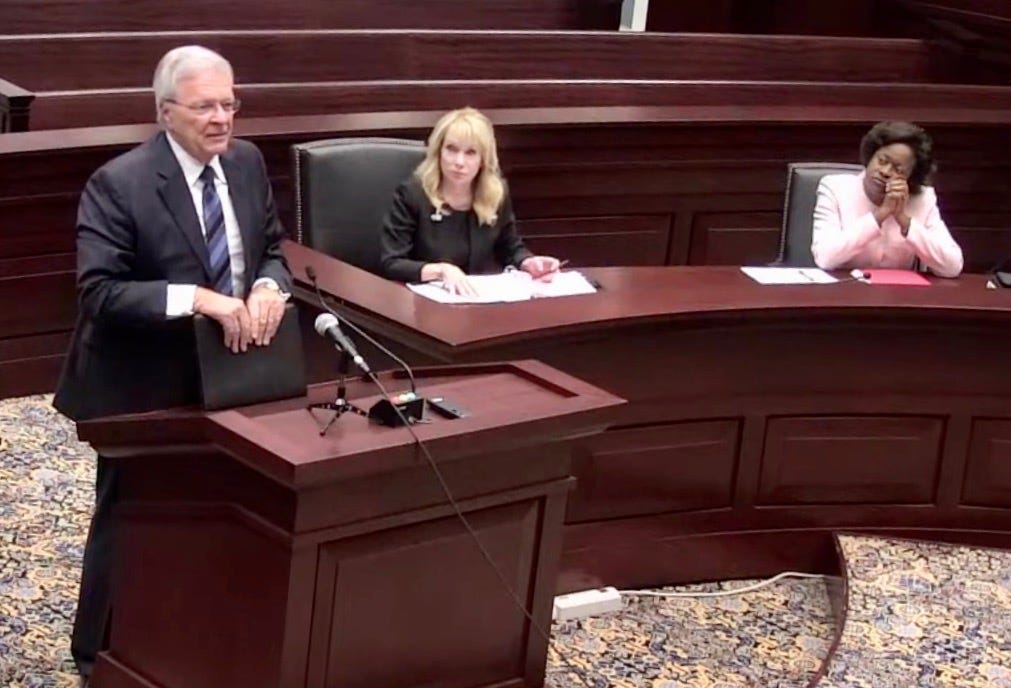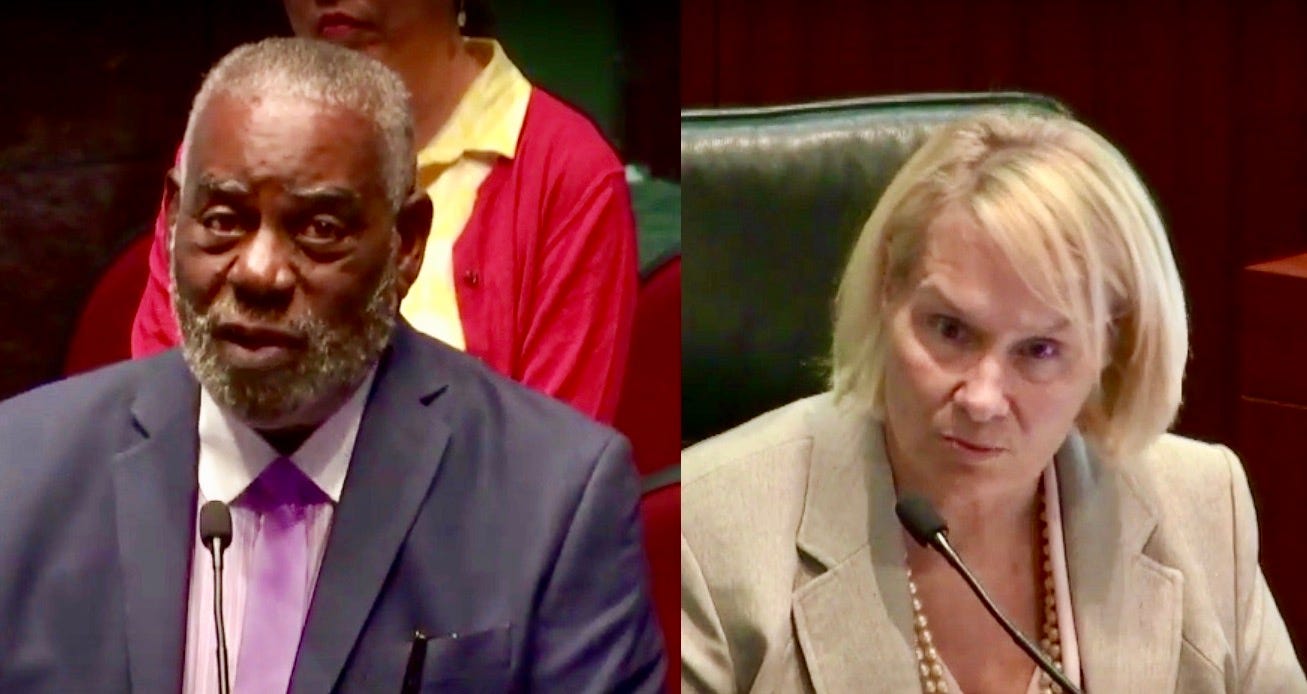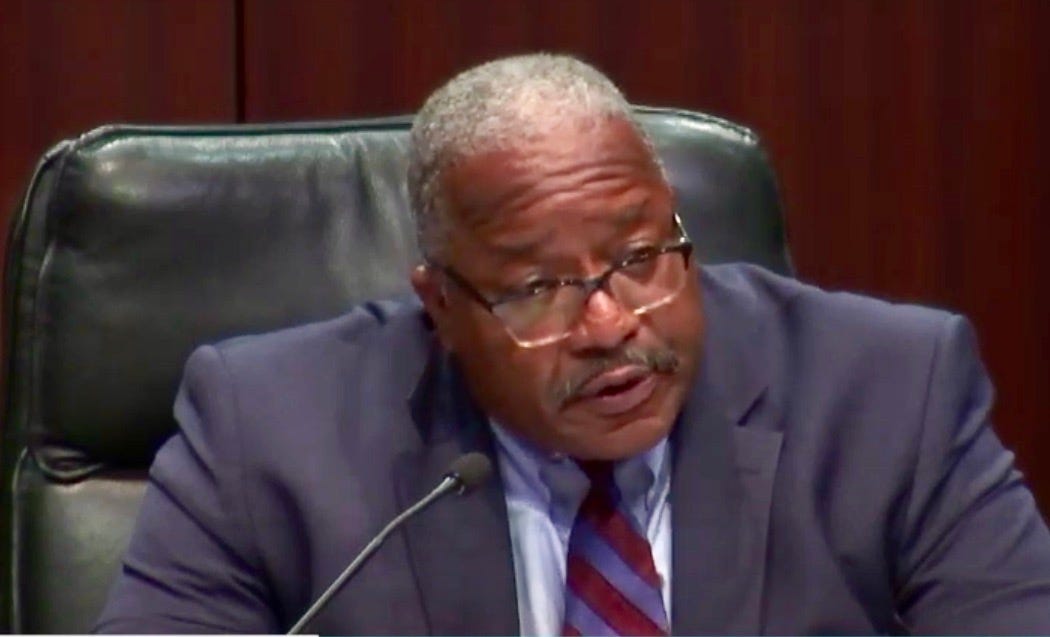Mayor blames administrator but Ethics Commission won’t drop case
‘That’s what this case really turns on … bad optics,’ Mayor Keith James’ lawyer argued. ‘There’s not a scintilla of evidence … that suggest that that friendship … translated to any corrupt purpose.’

What’s happened so far: While West Palm Beach officials moved forward with the no-bid $7.9 million security contract to a company represented by Willie Perez, a friend of the mayor’s, a decision to fire a long-serving city employee put the mayor in a pickle. When told she was being fired, the worker informed her supervisor that Perez had texted her a photo of a penis. And, she said, then-City Administrator Jeff Green knew about it.
Green later said in a deposition that he took the fall, resigning two days after her disclosure, to protect Perez from losing the security contract. Green’s replacement, Faye Johnson, began looking for a way to cancel the contract. And a competing bidder filed a complaint with the Florida Commission on Ethics, which began asking questions.
Catch up on Part 1 here and Part 2 here.
Third of three parts
After security contractor Willie Perez’s lurid text message became known internally at West Palm Beach City Hall and City Administrator Jeff Green resigned, Mayor Keith James promoted Faye Johnson to interim, and later permanent, administrator.
The public wouldn’t learn of the text for another month, when the city released documents exposing the episode.
Johnson had staff assemble a list of other no-bid contracts and saw that the contract to Perez’s company, PSC, stood out because it called for spending far more money, she told an ethics investigator.
“And just what I know to be good procurement practice and what I know from experience having been a former administrator when you’re talking about a contract at that level it’s just almost automatic that you go through a competitive process so I just had a very emphatic discussion with the mayor,” Johnson told investigator Kathleen Mann.
Johnson called in Procurement Officer Frank Hayden and City Attorney Kimberly Rothenburg, who had not objected to the no-bid contract when it came before the City Commission in September, to meet with the mayor.
In his January 2020 ethics interview, James said he learned then for the first time that the pair had misgivings about the contract. As a result, he said, he dropped the no-bid contract, kept PSC on the job and reopened the contract to competitive bidding.
James blamed Green.
“What I didn't know at the time is that legal had advised Mr. Green against doing that thing. That information never got back to me — that legal was advising against doing it. They said you could do it but I didn't hear it from Mr. Green or from legal at the time that you probably shouldn’t do it.
“Mr. Green was the one serving as the intermediary and maybe he was telling me what he thought I wanted to hear as opposed to what I should hear.”
In his interview, Green had said just the opposite.
“The mayor was in on all these conversations,” Green said. “He was there from Day One.”
‘Seems like this mayor is a little bit out of control’
At full strength, the Florida Commission on Ethics is a nine-person board, with five members appointed by the governor, two by the president of the state Senate and two by the speaker of the state House. At least four members must be from the opposing party.
Mann, the commission investigator, submitted her findings in March 2020 to Elizabeth Miller, an attorney advocate in the Florida Attorney General’s Office.
Miller’s job is to apply the law and prosecute the case, if need be.
She found no violations by James.
The mayor’s concerns, she wrote in her May 2020 report to the Ethics Commission, “appeared to be first and foremost to best protect the public’s safety through the collaboration and cooperation of its security services rather than to benefit his friend’s company.
“These facts present no evidence of favoritism or bias by respondent (James) based on their friendship. In fact, respondent was so certain this action was in the best interests of the public he was willing to stake his political future on this safety issue.”
She recommended a finding of no probable cause, urging dismissal of the case.
In a July 2020 vote to accept her recommendation, the board deadlocked 4-4, meaning the motion failed.
“We have a lot of history going on in our country right now about mayors being somewhat incompetent,” said Ethics Commissioner Willie Meggs, a former Leon County state attorney who voted against dismissal.
“And this situation it seems like this mayor is a little bit out of control.”
Others feared the ethics commissioners were overreaching.
“I don’t see the corrupt nature of the transaction. A mayor should be able to make local decisions,” said Ethics Commissioner Antonio Carvajal, who voted to dismiss. “And I’m not sure it's in our purview to mandate how local governments act for better or worse.”
After a second motion failed, the commission voted 7-1 to find probable cause, sending the matter back to Miller.
‘No evidence of wrongdoing’
Miller came back to the board in March 2022 with a nearly identical recommendation to dismiss the case.
She wrote that she had interviewed two city commissioners — Joe Peduzzi and Kelly Shoaf — the police chief, the city inspector general (apparently a reference to the county inspector general) and City Administrator Johnson, who told her of her misgivings about the no-bid contract.
Those interviews with potential witnesses were not conducted under oath and were not recorded, Miller told Stet.
She did not list Green among those interviewed.
“None of the potential witnesses say that respondent’s (James’) conduct was done with wrongful intent or that the act or omission was inconsistent with the proper performance of his public duties,” she wrote.
“In sum, there is no evidence of wrongdoing by respondent and the advocate (Miller) found no witnesses who believed respondent misused his public office. It would not serve the public’s interest to prosecute this case,” she wrote.
Again the board moved to accept her recommendation to dismiss the case. Again it deadlocked 4-4.
“I recognize the value of witnesses but does that change the fact-set that respondent had a personal relationship with that company and there … was a corrupt intent to make that company receive the business?” asked Commissioner JoAnne Leznoff, a retired House Budget Committee staffer.
“Other than a friendship, I found no facts to support that anything unethical occurred,” Miller replied.
“To me, the witnesses that were interviewed are not the witnesses that support the facts regarding the nature of this friendship,” Leznoff said later in the meeting.
Defending the decision, ethics Commissioner Don Gaetz, a former state Senate president and the father of Congressman Matt Gaetz, explained that he was acting on previous board discussions.
“That discussion was robust and informed my vote and my views on this matter today. So while my vote may be right or wrong … I would just say my vote was not in a vacuum but was informed by that prior discussion,” he said.
The deadlock left the board in the unusual position of asking the advocate to prepare a court case without evidence of wrongdoing.
“This is the strangest thing for me,” said Commissioner Jim Waldman, a Fort Lauderdale attorney. “To send an advocate in where she’s got no evidence, no evidence — I repeat that — no evidence, to support it. I think as an attorney you have an obligation to go to the court and say that.”

Mayor’s lawyer: ‘Not a scintilla of evidence’
As it contemplated what to do next, the commission heard from James’ attorney, Ron Meyer, who argued that friendship doesn’t necessarily mean favoritism.
“And that’s what this case really turns on. It’s bad optics. It looked bad because city officials — not just the respondent, plenty of them — were acquaintances with the person who was recommended for the sole-source contract.
“But there’s not a scintilla of evidence, not that I found, not that your investigator found, not that Ms. Miller found, that suggest that that friendship, that socialization, translated to any corrupt purpose, to any favoritism.”
The board took no action, retaining its 2020 finding of probable cause, and sending the case back to Miller for more investigation or a trial before an administrative law judge.
Since that time, nothing has happened publicly.
Three of the four ethics commissioners who voted against dismissing the case in April 2022 remain on the board. Glenton "Glen" Gilzean Jr., a gubernatorial appointee and former president and CEO of the Central Florida Urban League, is now the board chairperson.
Gaetz, the vice chair, and John Grant, the chairperson at the time, also remain. The fourth voter against dismissing, Leznoff, no longer serves.
Among those who voted to dismiss, Meggs, Waldman and Michelle Anchors remain. Carvajal no longer serves.
A ninth member, Ed Moore, did not vote in 2022. Like three of those still on the board, (Meggs, Waldman and Grant) Moore’s term expired in June. All four will continue to serve until reappointed or replaced.
But the board has not been asked to weigh in again.
As of June 21, Miller said she had not been engaged in settlement talks or filed documents to begin a formal hearing. The case remains open.
When asked by Stet why he hadn't tried to settle the matter, James referred to the advocate’s two recommendations to dismiss and said through a spokeswoman that he "is confident that he has not committed any ethical violations."






